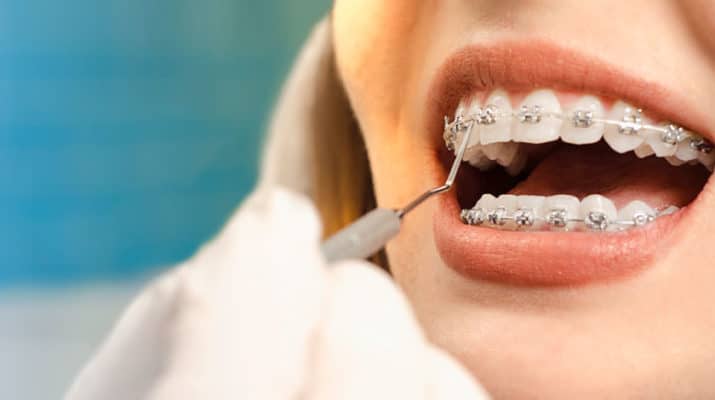By Deborah Jeanne Sergeant
If you or your child has just been fitted with braces, it may seem like your orthodontist has all the bases covered as you visit every eight weeks or so.
Braces from a reputable clinic like Metal braces Coral Springs are essentially a type of treatment that helps with correcting a wide range of oral health issues such as teeth misalignment and gum disease. In fact, braces can provide lots of benefits to their wearers and prevent wear and tear of your teeth and you can get that straight glowing smile with metal braces.
Although orthodontist are general dentists with additional training in orthodontia, you still need to see your general dentist for routine cleanings just as before braces. There is this emergency dentist office in Kyle – Kyle Parkway Dentistry that you can visit in case you need a second opinion.
“The general dentist is scrutinizing the teeth for tooth decay and gum-related problems,” said dentist John Carlile, owner of John Carlile, DDS General & Cosmetic Dentistry in Skaneateles. “If they’re not coming to see the general dentist and just seeing the orthodontist, although they may work with them for oral hygiene, tooth decay issues can get missed. They’re focusing on their work, the braces. The general dentist focuses on oral healthcare advice and scrutinizing for any decay issues.” You can also talk to your dentist regarding the laser dentistry procedures and know how it could benefit your case.
Before applying braces, orthodontists perform X-rays and clean the teeth as part of the dental hygiene exam procedure, but that’s not the same as a general dentist appointment since it doesn’t include all of the services a general dentist provides and these days there are virtual consultation as well given the situation of course. With development in healthcare there are easier methods like invisaligns for teens which doesn’t come in the way of their self-confidence. If your child is interested in invisalign then you should make an appointment as soon as possible.
“We have some who say, ‘I saw the orthodontist, so I don’t need to get my teeth cleaned,’ but it’s even more important to continue with your regular hygiene schedule,” said Kristin Nylen, dentist at Oswego Family Dentistry in Oswego. “You need dental visits to remove the deposits that build up.”
The general dentist maintains the oral hygiene through visits every six months, or more often as prescribed, especially for invisalign braces. Most orthodontists don’t do general or routine cleaning as a general dentist does.
Nylen said that regular visits are also important to prevent periodontal disease, check for decay and screen for oral cancer.
Some people mistakenly believe that wearing braces causes white discoloration on the teeth, but Nylen said that’s really caused by improper home care. The discoloration is called demineralization.
“If we see that’s starting to happen, we can prescribe fluoride supplement toothpaste to minimize the damage to the teeth,” Nylen said.
For people who choose clear aligners over traditional braces, Nylen said it’s also “really important to keep the teeth clean under the aligner. Any food, drink or plaque is held in place by the aligner and has prolonged exposure to the teeth.”
Before braces are applied, the patient should already have a good understanding of home care and good dental health and then ramp it up while their braces are in place.
“Oral hygiene is more difficult to maintain with braces and plaque can accumulate more easily,” said Anna Romans, dentist and owner of Romans and Sotani Dentistry in Camillus. “Good brushing, flossing and rinses will help out on a daily basis. The hygienist can point out areas you’re missing. When you have brackets and wires, you have new angles to reach above and below the wire. Without braces, it’s easier. Flossing will be trickier as you have to thread the floss through.”
In addition to obstructing brushing and flossing, part of the reason that brushing is harder with braces is that the extra items in the mouth — bands, brackets, wires and linked elastics — provide irregular surfaces to which food debris can cling, according to Charles DiCosimo, III orthodontist in private practice at Raineri and DiCosimo Orthodontics in Liverpool and Baldwinsville.
“There are significantly more areas for food and plaque to attach,” he said. “Flossing and brushing becomes more of a challenge and braces patients must allot more time to properly clean their teeth, gums, and all around their appliances. Patients with braces also require special tools in order to properly navigate around the brackets and wires while flossing, since regular flossing techniques would be blocked by the wire. These include such products as floss threaders, proxabrushes, and superfloss.”
He also advises avoiding sticky, sugary, and high acid foods, which can change the pH of the mouth and lead to enamel breakdown. When this happens, the patient’s teeth will decay and he or she may require dental implants.
A. Gregory Sohrweide, dentist at Cato Dental Services, LLC, advises special care should be taken around the gum line, where the teeth and gums meet.
A Water Pik cleaner and water flosser may aid in the process, but Sohrweide said these don’t replace standard brushing and flossing, since a mechanical means of removing food debris is necessary.
“The difference is the pik shoots a steady stream of water, but the flosser shoots a pulsating stream of water,” he said. “It does a little more thorough job. I recommend both very highly. They do an excellent job of washing around the braces.”

